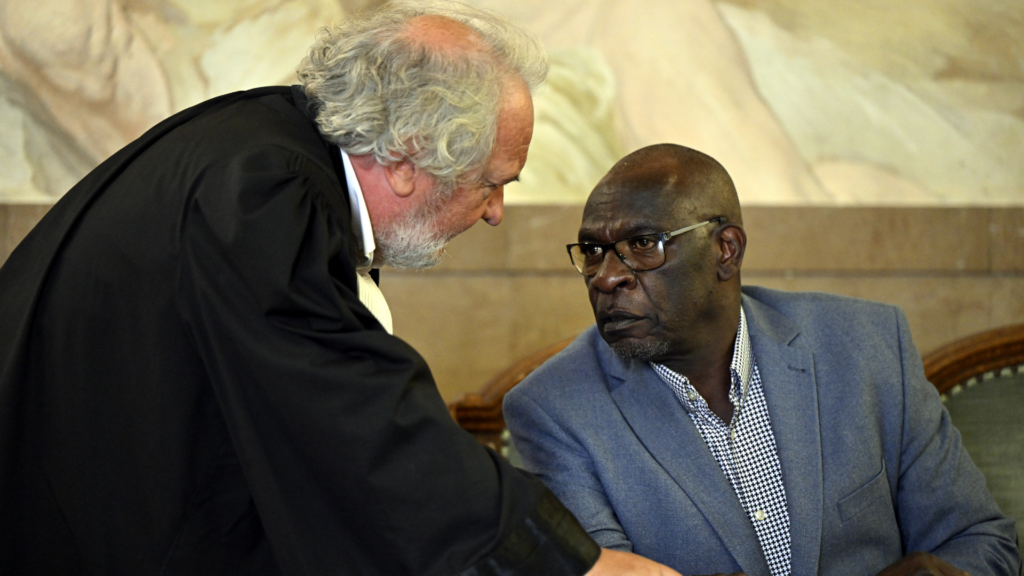A Brussels Assize Court jury has found Rwandans Séraphin Twahirwa and Pierre Basabosé guilty of genocide and war crimes committed in Rwanda in 1994.
The jurors, who handed down their verdict at around 8.20 p.m. on Tuesday, founds that the two Rwandans, who live in Belgium, committed multiple murders and attempted murders of Tutsis and moderate Hutus in Kigali between April and July 1994.
They also established that Twahirwa had raped many Tutsi women.
Basabosé, aged 76, and Twahirwa, 65, were accused of genocide and war crimes. The Federal Prosecutor’s Office had requested that they be found guilty of at least 56 murders committed during the 1994 genocide in Rwanda, and at least 13 attempted murders. The prosecution also accused Twahirwa of 12 rapes.
The jury found the two defendants guilty of most, but not all, of these crimes.
During the Rwandan genocide, Séraphin Twahirwa was suspected of leading Hutu militiamen, known as Interahamwe, in Kigali, especially in the city’s Gikondo sector, while Pierre Basabosé was mainly suspected of supplying arms to the Interahamwe in Gikondo.
Basabosé, diagnosed as suffering from mental degeneration, was not questioned by the court. His lawyer, Jean Flamme, had pleaded for his acquittal, questioning the reliability of the testimony.
Twahirwa, for his part, denied any involvement in the genocide, claiming that he had left Kigali as soon as the first massacres took place in early April 1994. His lawyers questioned the way in which the investigation had been conducted, claiming that witnesses had been “prepared” in Rwanda to burden the accused.
In its reasoning, the jury stated in particular that “although Séraphin Twahirwa tried to conceal his participation in the genocide, his account did not stand up to the testimony of his Interahamwe, his wife, surviving victims and inhabitants of the Gikondo sector.”
The jury noted that Twahirwa had assembled his Interahamwe on the evening of 6 April 1994, immediately after the attack on the plane of then President Juvenal Habyarimana. “The actions of his men reflected his instructions,” the jury found. “He gave the orders for the various attacks. It was he who decided which Tutsis were to be killed and which Tutsis were to be spared to be killed later.”
The jury also insisted on Twahirwa’s “determination”. “He did not hesitate to kill his brother-in-law as well as children and babies by throwing them against a wall,” the jury stated.
On the issue of the many rapes of which he was found guilty, the jury noted that these crimes “went beyond Séraphin Twahirwa’s sexual impulses, as he took care to physically harm and humiliate the Tutsi women.”
As proof of this, the jury noted that the fact that some of the women were found “with a bullet between their legs is no coincidence.” The rapes were an “attack on the fertility of Tutsi women and their social ties, given the deep taboo on rape” in Rwandan culture, the jurors established.
With regard to Pierre Basabosé, the jury noted that he was “endowed with substantial financial resources, which he used to finance a media outlet, Radio Télévision Libre des Mille Collines (RTLM), that fuelled hatred of the Tutsis.” It also felt that Basabosé had financed the Interahamwe in Gikondo sector, notably in “their missions of espionage and assassination of Tutsis.”
This assistance was not only financial, the jurors established, but also logistical. Basabosé made some of his vehicles available to the Interahamwe “so that they could carry out their punitive expeditions,” and supplied them with weapons, the jurors asserted, basing their verdict on witness accounts.
He also “collaborated in detecting recruits” and “propagated a discourse of hatred towards Tutsis,” some witnesses having recounted that he “congratulated, at the checkpoints, the Interahamwe who had done well.”
In conclusion, the jury found that Basabosé “condoned, even encouraged by his presence, the crimes” committed at Gikondo, and that he “was at the heart of the genocidal machine,” to the point of “assisting the genocidaires as they fled.”
Finally, the jury declared that Basabosé was now in a state of health that “impaired his capacity for discernment.” Several psychiatric experts had diagnosed him with a “mental disorder of the dementing type,” the jury noted, “which prevents him from enjoying all his mental faculties, even if he has a few moments of greater lucidity.”
After reading the guilty verdict for more than two hours, the court set the sentencing debate for Wednesday at 2.00 p.m., for the prosecutor’s closing address. The defence lawyers will plead on Thursday morning at 09:00.

